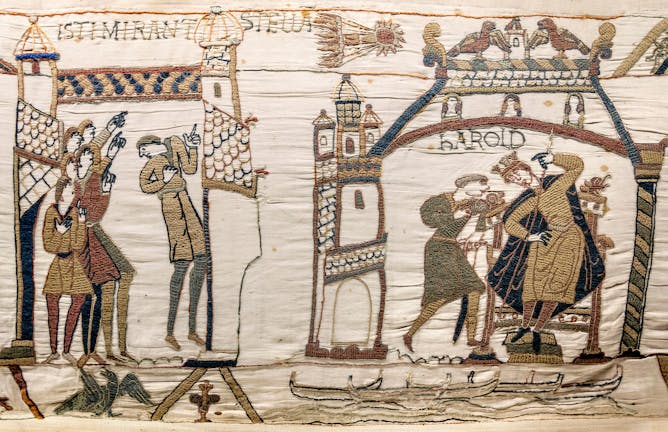|
As the death toll from Israel’s assault on Gaza passed 33,000 people yesterday, it was revealed in The Guardian newspaper that more than 600 UK lawyers and academics, including three former supreme court justices have written to the prime minister, Rishi Sunak, to warn him that sales of British weapons to Israel was in breach of international law and must cease.
The letter’s authors pointed out that the International Court of Justice had warned that there is a risk of genocide in Gaza and to contonue to supply Israel with arms would be in breach of the UK’s legal obligations. It has also been revealed that the government has received legal advice that the Israeli military’s actions in Gaza breach numerous international treaties. As legal scholar Lawrence Hill-Cawthorne explains, this places added pressure on the UK to do
what it can to restrain Israel. You can follow our coverage of the war in Gaza in our fortnightly update here.
We also examine new research that links perinatal depression with premenstrual mood disorders and consider what medieval chronicles can tell us about how thinkers of the day interpreted eclipses and other celestial events.
|

|
Jonathan Este
Senior International Affairs Editor, Associate Editor
|
|

EPA-EFE/Abir Sultan
Lawrence Hill-Cawthorne, University of Bristol
The UK government has received advice that Israel is breaking international law in its assault on Gaza, so has an obligation to stop supplying it with arms.
|

Women with a history of premenstrual disorders were found to be five times more susceptible to developing perinatal depression.
arthierry/ Shutterstock
Donghao Lu, Karolinska Institutet
This link suggests that understanding and treating one condition could help with managing the other.
|

Medieval scholars linked celestial occurrences, such as Halley’s comet, to events at home, such as the arrival of William the Conqueror in England.
DIT Archive/Alamy
Giles Gasper, Durham University; Brian Tanner, Durham University
Medieval scholars connected celestial events to changes that happened on the ground, such as the overthrow of the king.
|
World
|
-
Jonathan Este, The Conversation
A selection of our coverage of the conflict in Gaza from the past fortnight.
-
Stefan Wolff, University of Birmingham
Washington and Beijing have flashpoints to negotiate, but appear to be choosing to do this through diplomacy, for now.
-
Sarah Schiffling, Hanken School of Economics; Foteini Stavropoulou, Liverpool John Moores University
Humanitarian workers are protected by international law, but the number of aid agency workers being killed around the world is growing.
|
|
Politics + Society
|
-
Khadijah Elshayyal, The University of Edinburgh; Laura Jones, University of Wales Trinity Saint David
Online Ramadan content has boosted Muslim voices and empowered people to to speak for themselves and on their own terms.
-
John Frederick Wilson, York St John University
A bereavement counsellor explains how to cope with the loss of a parent.
-
Simon Potter, University of Bristol
A universal fee still seems the most obvious way to fund Britain’s most important public broadcaster.
|
|
Arts + Culture
|
-
Rayna Denison, University of Bristol
The MonsterVerse is a slick, well-defined giant monster mythos that has further globalised Godzilla – and King Kong along with him.
-
Abigail Loxham, University of Liverpool; Deborah Shaw, University of Portsmouth
Documenting Spain’s #metoo moment, the film articulates women’s fury at the deeply entrenched sexism and misogyny that permeates Spanish society and culture.
|
|
Environment
|
-
Matthew Carl Ives, University of Oxford; Belinda Wade, The University of Queensland; Saphira Rekker, The University of Queensland
Cement and fossil fuel production has reached unprecedented levels, with most of the emission growth traceable to a relatively small number of companies.
|
|
Health
|
-
Michael Lambert, Lancaster University
In January 1948, 84% of GPs voted against the NHS.
|
|
Science + Technology
|
-
Kirk Chang, University of East London; Alina Vaduva, University of East London
AI needs careful monitoring and the right policies to ensure it can benefit the fight against climate change.
-
David Rothery, The Open University
The Solar System could be awash with oceans, not on the surface but hidden inside the most surprising bodies
|
|
Podcasts
|
-
Gemma Ware, The Conversation
Scientists Jan Zalasiewica and Erle Ellis on the recent decision to reject a proposal for a new geological epoch, the Anthropocene. Listen to The Conversation Weekly podcast.
|
|
|
|
| |
|
|
8 March - 18 May 2024
•
Glasgow
|

|
16 - 18 April 2024
•
Southampton
|

|
24 April 2024
•
Birmingham
|

|
|
|

|
|
|
|
| |
| |
| |
| |
| |
|
|